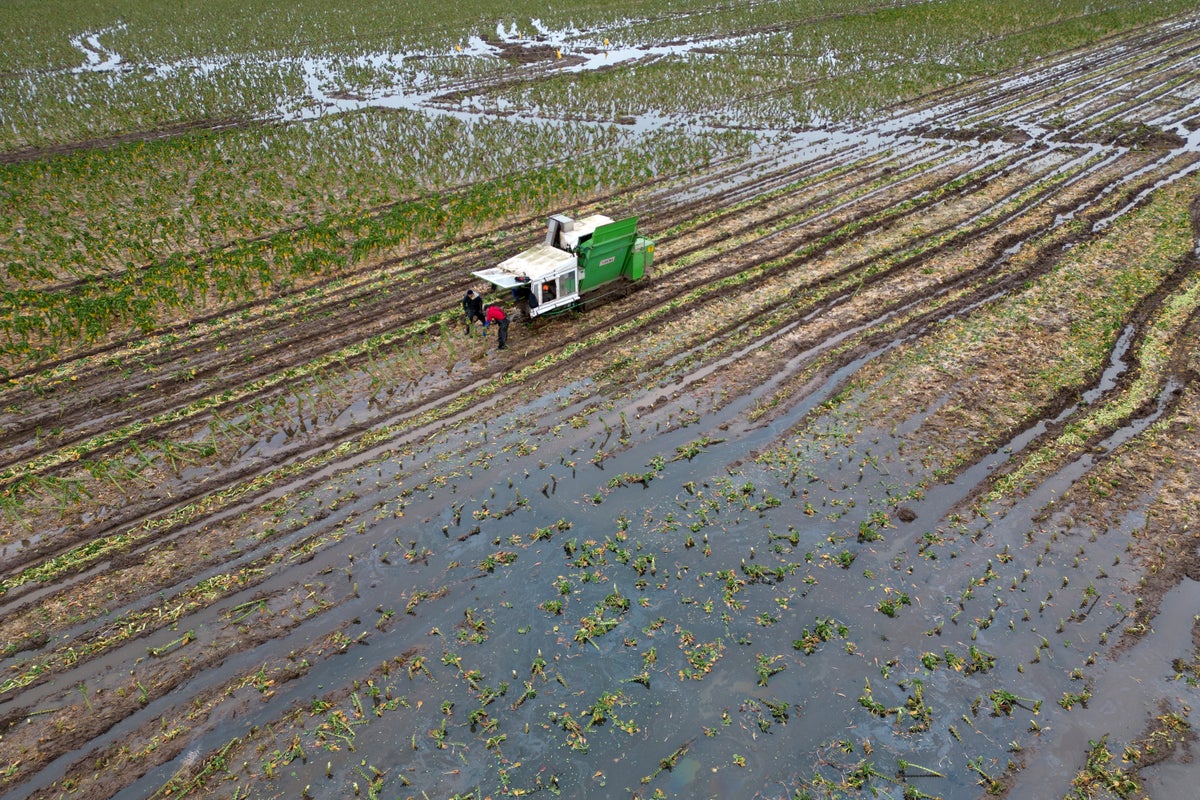
A supermarket chain is temporarily accepting some smaller-than-usual vegetables in a bid to help flood-hit farmers.
Tesco has implemented a relaxation on size requirements for sprouts, cauliflowers, cabbages and leeks, amid reports it has become a race against the clock to pull vegetables from the ground before they rot after growing underwater due to flooding.
The move is aimed at helping to keep British vegetables on the shelves rather than imports and to reduce the risk of shortages.
Brussels sprouts are harvested in a flooded field at TH Clements and Son Ltd near Boston, Lincolnshire— (Joe Gidden/PA Wireshould read: Joe Gidden/PA Wire)
The supermarket said farmers will still supply them with more of their crop and avoid having to sell at lower prices on the open market.
Storm Henk battered the UK last week, bringing heavy rainfall and subsequent flooding, which has affected growers around the country, including in Lincolnshire, East Anglia, Cornwall and Scotland.
The National Farmers Union horticulture and potatoes board chair, Martin Emmett, told The Independent: “The recent poor weather, flooding and heavy rain has disrupted the growth and harvesting of some vegetable crops, such as potatoes, since land became waterlogged or flooded.
A flooded field of brussels sprouts at TH Clements and Son Ltd near Boston, Lincolnshire— (Joe Gidden/PA Wire)
“We have no expectations of shortages currently, but it remains important that we make the best of what’s available with supermarkets offering flexibility to growers when it comes to crop specification. In doing so, the food chain from farm to plate will avoid unnecessary food waste.”
One of the biggest growers of winter vegetables, TH Clements, based near Boston in Lincolnshire, reported that they have only had a handful of dry days since October, which has made harvesting difficult.
TH Clements commercial director John Moulding said: “This is the worst flooding we have had this century and we have lost about 20 per cent of our total winter crops including sprouts, cabbages, cauliflower and leeks.
Leeks growing in a flooded field at TH Clements and Son Ltd near Boston, Lincolnshire— (Joe Gidden/PA Wire)
“It’s been a very tough time for us for more than three months both physically and financially in having to pull the vegetables out of the muddy fields.
“We have literally had to race against the clock to get the vegetables pulled out of the ground to stop them from rotting.
“The flexibility that Tesco has given us has allowed us to maximise the amount of product we can get on their shelves therefore guaranteeing greater availability for shoppers.”
Brussels sprouts are harvested in a flooded field at TH Clements and Son Ltd near Boston, Lincolnshire— (Joe Gidden/PA Wireshould read: Joe Gidden/PA Wire)
Sprouts were a particular problem due to their size and some were growing underwater due to the flooding.
In order to dry the wet sprouts, Tesco worked with growers to develop a new drying method, using cool air blowers to blow the water off them in their storage pallets.
Tom Mackintosh, Tesco Fresh Produce and Horticulture Director, said: “By accepting slightly smaller sprouts, cauliflower, cabbages and leeks, we can support the fresh produce industry while ensuring that customers are able to continue to buy British winter vegetables.
“We’re pleased to be able to provide support to our growers, farmers and suppliers who are facing really challenging harvesting conditions.”







